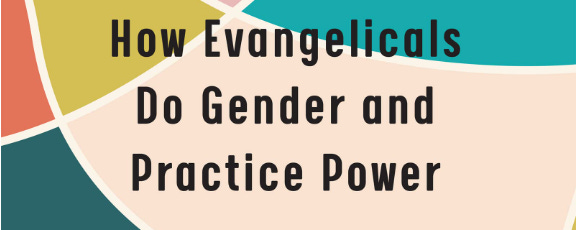The American claim of colorblindness covers over the sin of racism because the ones ruling colorblindness rose to the top in a system shaped by whiteness, invisible though it may be (and not always). The same can be said for genderblindness: it covers for male-centeredness. Lisa Weaver Swartz, in Stained Glass Ceilings: How Evangelicals Do Gender and Practice Power, examines how Asbury Seminary’s genderblindness, its Equality Story as well as its Difference Story, rides the wave of a men centeredness that is an American systemic story.
There is no reason for Asbury not to come to terms with this. It drives a hope for equality and egalitarianism, and become more of both will only make Asbury more consistent with its mission. I’m not pointing fingers at Asbury so much as becoming open to how my own seminary, Northern, can learn from this excellent section of Weaver Swartz’s book.
Genderblindness is blind to male privilege, to white male privilege, to while male systemic structures. Weaver Swartz expounds four features of centering men at Asbury:
Centered in Space
Men speak more in classrooms; men fill the space in rooms; women don’t. What men wear become more diverse while women’s attire has to toe a line between the fashionable and the overly masculine. There is a “feminine tightrope.”
Men express confidence in the academic spaces; they become confident in interpreting scriptures and theology and history and culture. Women do, too, but they can feel “minority status” as the same time. Women can become invisible in academic spaces, at tables, when they are with their husbands – when both are students.
Centered through Marriage
Asbury is like most evangelical cultures: heteronormativity rules and one is most prepared for ministry if one is married. The Difference Story obtains here especially. Congregations tend to prefer the married man, or the married woman. Married men benefit the most from the “second shift” that consumes the time of women, permitting men to network and read and become more prepared.
The pull toward marriage for single skims along the surface at all times. Single men especially are provided with a vision of “sexual wholeness” in Asbury’s “Band of Brothers,” a monthly small group that forms accountability for men. She thinks the flexibility of Asbury’s view of masculinity permits a self-identifying gay man who is committed to celibacy.
Centered by Calling
This one is big. If a man senses a call, the doors are already wide open. If a woman senses a call, some doors have to be knocked on and others have to be knocked down. The system has been formed for the calling of a man.
I cannot tell you how many times I have heard this at Northern, an even more explicitly egalitarian school, in the last decade. Women can be called, can be educated, can be gifted, can rise above the talents of men, but that does not mean the doors are wide open for the woman looking for a pastoral position in a church.
Kate Bowler’s important book tells why so many women have gone parachurch on the church.
If the man’s sense of a calling is restricted only by the man’s will or giftedness, a woman’s calling has more “ambiguity” about it. Women talk “Spirit” calling and discernment more than the men.
A calling to a local church is a socially mediated, not just personally-chosen, calling. That society was formed over time by men and for men.
Most men fail “to recognize the cultural patterns and economic structures that fast-tracked their own careers while holding women – perhaps even their own wives – back.” #boom
Centered by History
Asbury’s history, like nearly all seminaries and especially evangelical seminaries, tells a story that centers men: statues, named buildings, walls in buildings of past presidents, most of whom or all of whom are (white) males.
Faculty rosters are the same. That is, “men have largely constructed the parameters of theology, assessed modes of mission, and interpreted biblical texts.” Undeniable.
Most of these seminaries have an invisible centering of males. The curricula nurture students into that centering of men.
“Cultural legacies are hard to displace.”
And the invisibility of it all nurtures students not to see it, and most therefore don’t. Women have to do a “theological” second shift to find systemic cultures that are shaped or at least influenced by women.
The genderblindness at Asbury, like the complementarian story at Southern Seminary, has shaped Asbury. It favors the individual and has not sufficiently become self-aware of genderblindness’s systemic nature. The empowerment of Asbury “is available to women to the degree that they are willing and able to cooperate with the constraints of stories that center men.”
Inequalities, both structural and cultural, as she closes down this chapter, “exist beyond individuals, embedded in institutional systems, upheld by behavioral practices, and normalized through cultural processes.”
I add one she brings up but does not make a full point of: Centered by America
This system is American as much as it is Christian as much as it is evangelical.
What a wonderful book!






My husband I and have experienced some rather funny happenings in genderblind spaces. When in conversations with male pastors, they often ask me not about me but about my husband. They wish to know what he is doing and how he is. I find that so strange as if asking me how I am and what I am doing is somehow too intimate. It's weird. I once met a woman in leadership who wondered about my husband's masculinity due to the fact that he had a wife who was a pastor. Once we visited a church when the male greeter apologized to my husband for the fact they had a woman lead pastor. He shared with him how weird it was and then elbowed him--implying that it was somehow sexually tempting to have a woman pastor. Upon entering the service, we noted that the woman pastor was very mid-life in age, wore a lose fitting dress. (hardly an obstacle) This same greeter, then cornered my husband after the service again elbowing him with a wink, wink, about how he felt about a woman pastor. We didn't know whether to laugh or cry--we just laughed because the whole situation was so funny. We did feel for the pastor who probably did not know that her greeter was undermining her ministry.
Excellent!!!! May our hearts break for all who are treated less than God has commanded us to treat each other.